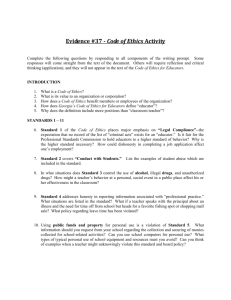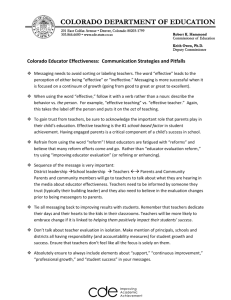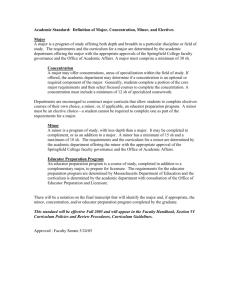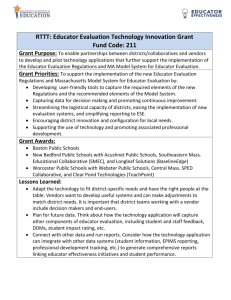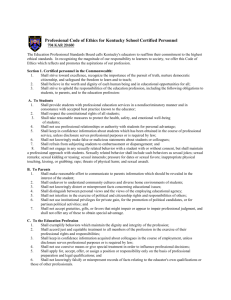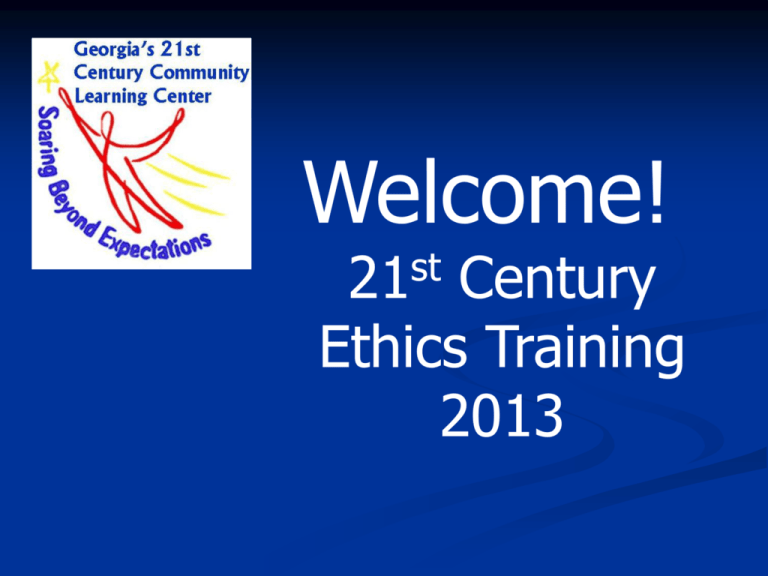
Welcome!
st
21
Century
Ethics Training
2013
Ethics:
A code of moral standards for
what is “good” and “right” as
opposed to what is “bad” or
“wrong”.
ethics
quotes.docx
The following
information is
excerpted from
the GA Code of
Ethics for
Educators
Expectations and Boundaries
of Professional Educators
The Code of Ethics,
State and Federal Law,
DOE and BOE Rules
Establish Standards for
Educator Conduct
Code of Ethics - 11 Standards
1.
2.
3.
4.
5.
6.
7.
Legal compliance
Conduct with students
Alcohol or Drugs
Honesty
Public funds and property
Remunerative Conduct
Confidential information
Code of Ethics - 11 Standards
8.
9.
10.
11.
Abandonment of Contract
Required Reports
Professional Conduct
Testing
Levels of Sanctions
Warning
Reprimand
Suspension
Revocation
Denial of Certificate
10
Educators are held
to higher standards
than other
professionals!
"Don't worry that
children never listen
to you. Worry that
they are always
watching you."
Robert Fulghum, American author (b. 1937)
Professional Educators
have the responsibility for
establishing and
controlling the boundaries
in their professional
relationships.
Standard 2
Conduct With
Students
The Most Important
Boundary
Code of Ethics Standard 2
An educator shall
always maintain a
professional
relationship with all
students, both in and
outside the classroom.
A STUDENT is anyone:
enrolled in a Georgia public
or private school from
preschool through grade 12,
or
anyone under the age of 18.
For the purposes of the Code
of Ethics, the enrollment
period for a graduating
student ends on August 31 of
the year of graduation.
Professional Relationship Boundary
Child Abuse
Including Physical
and Verbal Abuse
O.C.G.A. § 19-7-5
‘Child abuse’ includes the following
conduct by a child’s parent or caretaker:
Physical injury or death (by other than
accidental means)
Neglect or exploitation of a child
Sexual abuse - an act of apparent sexual
stimulation or gratification ...
Sexual exploitation - allows, permits,
encourages, or requires a child to engage in
prostitution or sexually explicit conduct ….
Professional Relationship Boundary
Sexual
Misconduct
Sexual Abuse of
Students
The Unforgivable Boundary
Violation
Sexual Abuse is defined as
ANY sex act with a student!
Sexual Abuse
of Students
Sexual Misconduct Rarely
Begins With an Act of
Sexual Abuse
A boundary violation
involving sexual contact is
more of a process than a
single event.
Young people instinctively
recognize these boundary
violations and often
nickname the employee
engaged in such violations a
“pervert,” based on their
perceived sense of
inappropriateness.
Mary Jo McGrath
Student Relationships
Teacher was alone in car with a girl and
had an inappropriate conversation with
her on facebook about kissing her.
Two year suspension
25
Avoiding
Allegations of
Inappropriate
Relationships
Student Relationship Guidelines
Be Friendly,
Not a Friend.
Student Relationship Guidelines
Choose
Appropriate
Settings
Student Relationship Guidelines
Social Networking
Don’t accept students as friends
and decline any student initiated
social network friend requests.
Don’t post anything on a website
that you would not post on the
front door of the school.
Standard #2 continued:
Unethical Conduct with Students Includes:
7.
failing to monitor or prevent the
use of alcohol or
illegal/unauthorized drugs by
students who are under the
educator’s supervision (including but
not limited to the educator’s residence or
any other private setting).
Professional Boundary
Other
Boundaries in
the Code of
Ethics
STANDARD # 1 – LEGAL
COMPLIANCE
An educator shall
abide by federal,
state, and local laws
and statutes.
Standard #3 - Alcohol or
Drugs
An educator shall
refrain from the use of
alcohol or illegal or
unauthorized drugs
during the course of
professional practice.
Illegal and
Unauthorized
Drugs are Always
Illegal and
Unauthorized.
Standard #4 - Honesty
An educator shall
exemplify honesty
and integrity in the
course of professional
practice.
Standard #4 - Honesty
Unethical conduct includes but is not limited to falsifying,
misrepresenting, or omitting:
1. professional qualifications, criminal
history, college or staff development
credit and/or degrees, academic award, and
employment history;
3. information regarding the evaluation of
students and/or personnel;
Standard #4 - Honesty
Unethical conduct includes but is not limited to, falsifying,
misrepresenting, or omitting:
4. reasons for absences or leaves;
5. information submitted in the
course of an official
inquiry/investigation;…
Standard 5 - Public Funds and
Property
An educator entrusted
with public funds and
property shall honor that
trust with a high level of
honesty, accuracy, and
responsibility.
Public Funds and Property
An audit of a yearbook account revealed a
significant deficit and $945.25 in
unaccounted funds. The educator stated
that errors in recordkeeping including the
deposit of funds to the wrong student
activity account could have resulted in the
unaccountable funds.
Suspension
39
Standard #6 - Remunerative Conduct
An educator shall maintain
integrity with students,
colleagues, parents,
patrons, or businesses
when accepting gifts,
gratuities, favors, and
additional compensation.
Standard #7 - Confidential Information
An educator shall comply with
state and federal laws and
state school board policies
relating to the confidentiality
of student and personnel
records, standardized test
material and other
information.
Standard #8 - Abandonment of Contract
An educator shall fulfill all
of the terms and
obligations detailed in the
contract with the local
board of education or
education agency for the
duration of the contract.
Standard #9 - Required Reports
An educator shall file
reports of a breach of one or
more of the standards in the
Code of Ethics for
Educators, child abuse, or
any other required report.
Standard #10 - Professional Conduct
An educator shall
demonstrate conduct that
follows generally recognized
professional standards and
preserves the dignity and
integrity of the teaching
profession.
Standard #11 - Testing
An educator shall
administer state
mandated assessments
fairly and ethically.
Standard 11: Testing
Unethical conduct includes but is not limited to:
1.
2.
committing any act that breaches Test
Security; and
compromising the integrity of the
assessment.
Acts that Breach Test
Security/Confidentiality
Possessing unauthorized copies of state
tests.
Copying or taking notes on test items.
Revealing in any manner any part of
secure copyrighted tests to students or
others.
Acts that Breach Test
Security/Confidentiality
Discussing test items or answers.
Using secure test items and prompts
for instructional purposes.
Reviewing answers to test questions.
Failing to inventory test materials
upon receipt.
Acts that Compromise the Integrity of
the Assessment.
Failing to provide or attend required
training.
Failing to provide state approved
accommodations.
Providing accommodations not in an
approved plan.
Failing to communicate needed
accommodations for a student.
Reading parts of the test to a student except
where indicated in written plans or directions.
Acts that Compromise the Integrity of
the Assessment.
Failing to provide an appropriate testing
environment.
Failing to monitor testing environment.
Failing to provide or ensure that proper tools
are used during testing.
Failing to follow the established testing
schedule and order of test administration.
Acts that Compromise the Integrity of
the Assessment.
Failing to ensure students are given the
correct form and/or grade level.
Failing to follow the directions specified in
the manual.
Allowing students too much or too little
time.
Coaching students during the test.
Interpreting, explaining, or paraphrasing
test items.
Providing answers to test questions.
Acts that Compromise the Integrity of
the Assessment.
Erasing or altering student answers (Erasure of stray
marks that would interfere with scoring is appropriate!) .
Failing to ensure accurate completion of student
information.
Discouraging students from putting forth optimal
effort.
Encouraging student absenteeism in order to
avoid testing.
Reclassifying students for the purpose of avoiding
state testing.
Other Grounds for Disciplinary Action
against a Certificate:
1. unethical conduct as outlined in The Code of
Ethics for Educators, Standards 1-11;
2. disciplinary action against a certificate in
another state on grounds consistent with those
specified in the Code of Ethics for Educators;
3. order from a court or a request from DHR that
a certificate be suspended or denied for nonpayment of child support;
Other Grounds for Disciplinary Action
against a Certificate:
4. notification from the GHEAC that the educator
is in default and not in satisfactory repayment
status on a student loan;
5. suspension or revocation of any professional
license or certificate;
6. violation of any other laws and rules applicable
to the profession; and
7. any other good and sufficient cause that
renders an educator unfit for employment as
an educator
Review
Be Friendly-not a friend.
School computers should be used for
business.
Take state testing seriously
Mandated reporting of violations
Confidentiality
Honesty and Integrity
Thank You
for coming!
Check your
email for
your quiz &
certificate

